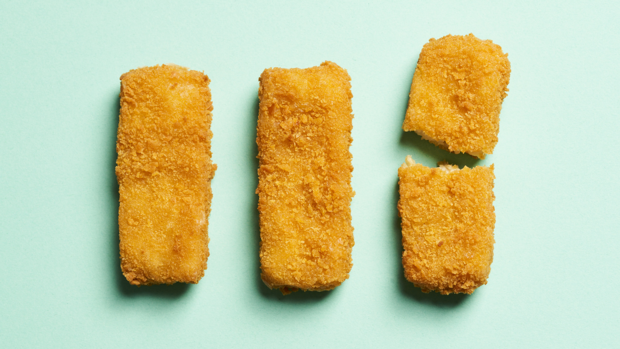The fish fingers consist of cultured trout cells mixed with vegetable protein.
(Photo: Bluu GmbH; Anna Brauns)
Dusseldorf Last year Bluu Seafood was the first European food tech company to present fish meat from cell cultures. The German start-up has now completed its Series A financing of 16 million euros, as the company announced on Wednesday. So far, the North Germans have collected 23 million euros.
The breaded fish products are made from trout cells that are cultured in a bioreactor at Bluu Seafood and are enriched with vegetable proteins. The round was led by Sparkfood, a subsidiary of the Portuguese food group Sonae, and the investment arm of LBBW. Investments include SeaX Ventures, Delivery Hero and Dr. Oetker.
“Together with our strong international investors, we can start the next development stage and bring our first products to market,” said Sebastian Rakers, who founded Bluu in Lübeck with Simon Fabich in 2020. Rakers, who holds a doctorate in marine biology, had previously researched at the Fraunhofer Institute for Marine in the fields of biotechnology and cell technology.
Fish from cell cultures should solve a global problem. According to the environmental protection organization WWF, more than 35 percent of the commercially exploited species worldwide are considered overfished and 57 percent are exploited to the maximum. In the Baltic Sea, for example, the fishing quotas for herring and cod have recently been greatly reduced for reasons of species protection.
At the same time as the financing round, the young company announced that, after Singapore, it had also applied for approval for its in vitro fish in the USA. The EU and Great Britain are to follow.
Bluu Seafood expects approval in Singapore in 2024
The news comes days after California startups Good Meat and Upside Food received the first US approvals for their cell-culture chicken. Another milestone following the official approval for in vitro chickens from Good Meat mother Eat Just in Singapore in late 2020.
Bluu Seafood expects its fish to be approved in Singapore by 2024. But before that, the food tech has to prove that it can scale its production in the laboratory. A pilot plant with bioreactors with a volume of up to 500 liters will open in Hamburg in autumn. In addition to fish fingers, Bluu Seafood’s 32 experts work on more complex products such as fish fillets and salmon sashimi.
Christian Dammann (COO) and the co-founders Sebastian Rakers and Simon Fabich (from left) are pioneers for in vitro fish in Europe.
(Photo: Bluu Seafood)
In vitro production also protects land-dwellers: Fish from the sea, river or lake is often contaminated with heavy metals, antibiotics and microplastics. All of this is avoidable in bioreactors. Bluu claims to breed the fish from non-GMO salmon and trout cell lines. The necessary growth media would do without animal serum.
Jeff Bezos and Leonardo DiCaprio are invested in in vitro fish
Investor Sparkfood emphasizes: “We focus on disruptive innovations in the food sector that protect the environment and at the same time are scalable enough to make a relevant contribution to feeding the growing world population,” says Anouk Veber, Head of Ventures at Sparkfood. Bluu Seafood has provided evidence of this.
Rakers and his team are considered leaders in Europe. However, a total of 156 food techs are currently researching meat and fish from cell cultures worldwide, according to current figures from the think tank Good Food Institute. The companies have received around $2.8 billion in capital so far. For example, Wanda Fish in Israel, Umami Meats and Shiok Meats in Singapore and Blue Nalu in the USA are working on fish from the bioreactor.
>> Read also: Proteins from the fermentation tank – This is how start-ups want to replace cheese and meat
A pioneer is Wildtype from California, which raises sushi-quality salmon. According to Crunchbase, the food tech has so far raised $123 million – and has convinced prominent investors such as Amazon founder Jeff Bezos and actor Leonardo DiCaprio.
But the production is still very complex and expensive: 100 grams of wild-type salmon cost around 115 dollars. However, wildtype founder Aryeivo believes that fish from cell cultures has a clear advantage over in vitro chickens. In any case, consumers are willing to pay much more for fresh wild salmon than for chicken, for example.
It will probably be many years before in-vitro fish come onto the market in Germany. In principle, the consumer centers welcome the efforts to use in-vitro fish to counteract not only animal suffering but also, in the long term, overfishing of the seas. However, consumers should be able to clearly see whether the fish comes from the laboratory.
More: USA grants approval for meat from cell cultures
